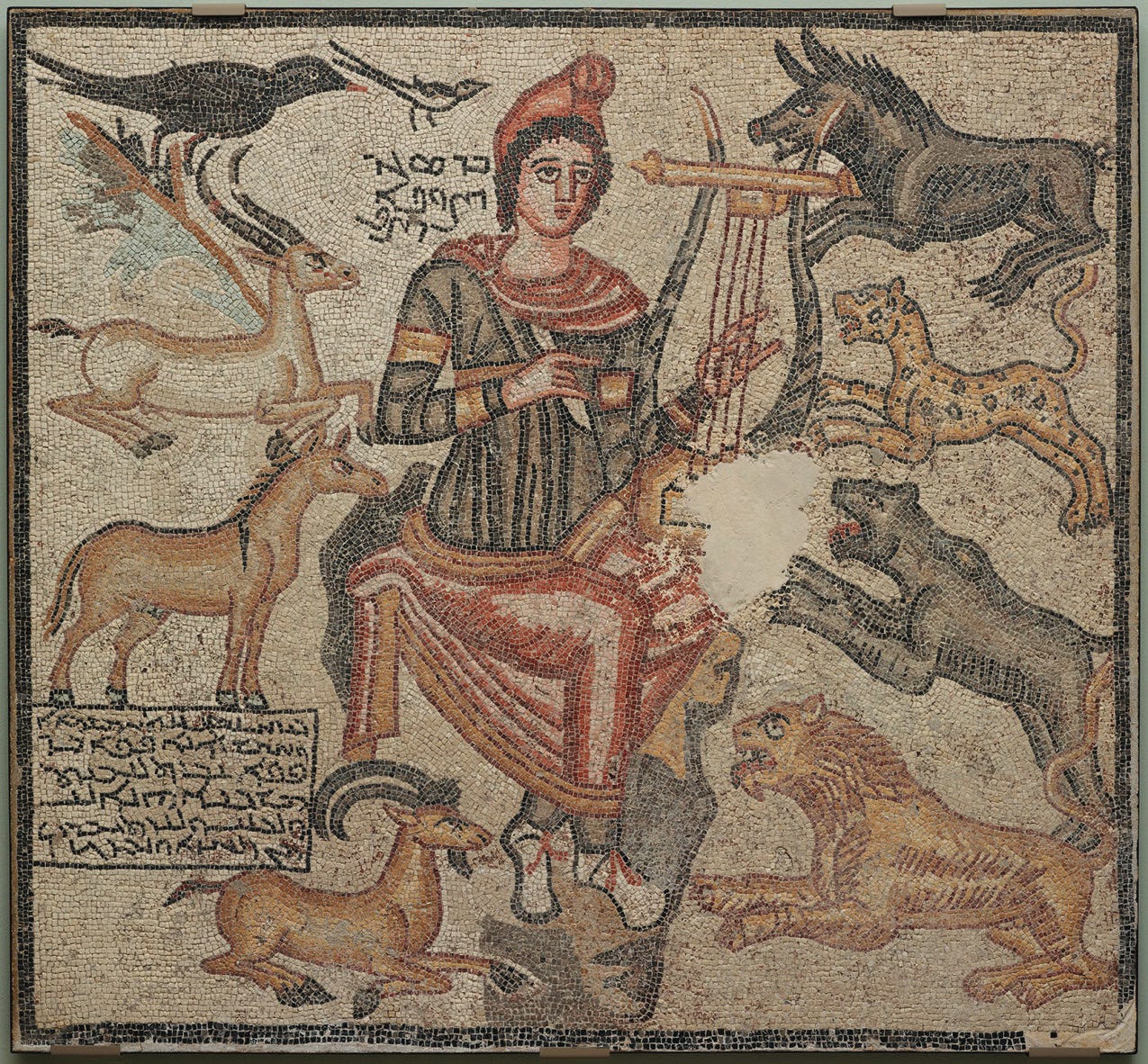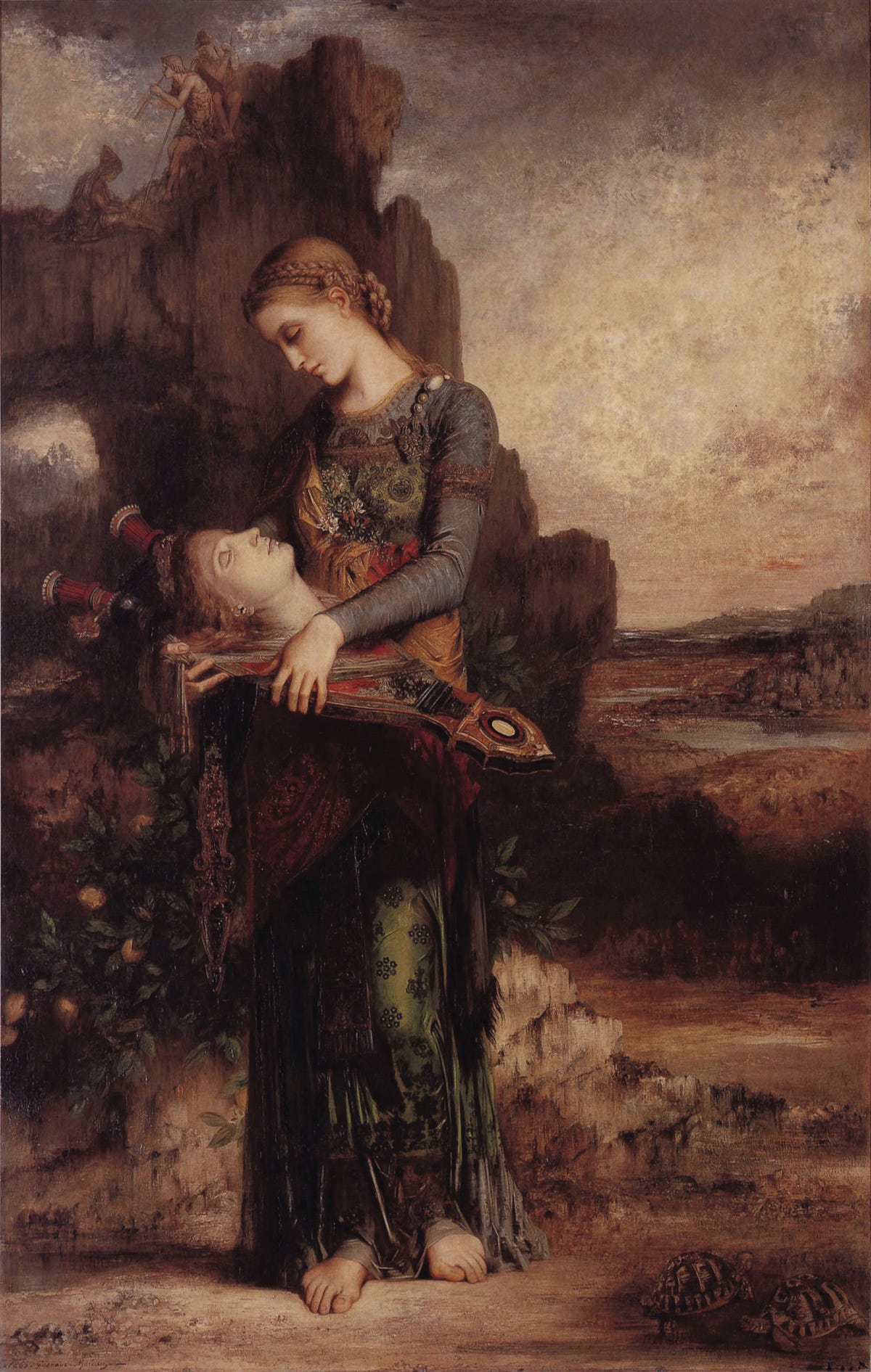Exegesis of the Song ‘Orpheus’ by David Sylvian
Re-mix from Katabatic Wind: Good Craic Fueled by Fumes from the Abyss
“Orpheus” could be my all time favorite song, so something a little lighter for today, a look at this paean to poetic inspiration and beauty by the phenomenal songwriter and singer David Sylvian. At the end we have provided two videos, one promotional and one performance of the song live. Sylvain began as frontman for the 80s band Japan, and followed with a brilliant solo career, and knows how to surround himself with brilliant talent like Robert Fripp, Bill Nelson and Mark Isham. His masterpiece is Secrets of the Beehive, followed closely by Gone to Earth, Alchemy: An Index of Possibilities, and for those who like stronger stuff, his works with Fripp: The First Day and Damage and finally, two of the best ambient albums out there, with Holger Czukay: Flux + Mutability and Plight and Premonition.
Orpheus mosaic from 194 BC recently returned to Turkey after being taken from Şanlıurfa.
On the right side of the well-fitted house of Hades is a spring, and close to this spring stands a shining cypress:
Around this place the descending souls cool themselves.
Do not approach this spring.
But proceed to the lake of Mnemosyne (Memory)
with cold water flowing forth: There are guardians here:
And they will ask you with shrewd speech
what you are looking for in the darkness of deadly Hades. Say: “I am a child of Earth and starry Heaven:
and I am parched with thirst and perishing: But give me
to drink from Mnemosyne’s lake.”
And they will show you to the Chthonian king:
and give you to drink from Mnemosyne’s lake:
And then having drunk you will walk on the holy path of the many, on which also other renowned mystai and bakkhoi walk
—Hipponion Orphic tablet
“Thracian Girl Carrying the Head of Orpheus on His Lyre” by Gustav Moreau, 1865.
David Sylvian’s Secrets of the Beehive from 1987 is not a CD infused into the popular cultural mindscape, and not likely to generate a 33 1⁄3 book, but one could guess that it makes the desert island list of everyone who has devoted time to it.
Sylvian is at his most lyrical, each note of his singing what it needs to be, a lead instrument, with the rest of the band showing it in better and better light. Now, in this musical age, twisted beats and fuzzy, glitchy production obscure lyrics. All vocals in pop music, especially by women, are synthetically twisted to deliver vibrations from South Hades. Even Sylvian, whose voice compares to Nick Drake’s in tone that one never tires of (not Drake, please), himself has stopped singing lyrically, and mostly speaks avant guardedly amidst mildly-discordant electronics, with the occasional return to brilliance like ‘World Citizen’.
But that was now and this is then. It is obvious that Sylvian knows that ‘Orpheus’ is the standout song on Secrets of the Beehive, since these are the only lyrics reproduced in the CD booklet. The song is in three sections, roughly analogous to a darkness-enlightenment-reintegration structure. The chorus comes in after the second and third verses, with a curious 17-second pause between the two.
Standing firm on this stoney ground
The wind blows hard
Pulls these clothes around
I harbour all the same worries as most
The temptations to leave or give up the ghost I wrestle with an outlook on life
that shifts between darkness and shadowy light
I struggle with words for fear that they’ll hear
But Orpheus sleeps on his back still dead to the world
Someone, let’s say the bard, is in the midst of it. Winds of life’s vicissitudes are blowing the external, with only a stoney, infertile ground to hold to. But the winds are blowing internally too: what view of life can you hold to, like a flapping cloak, when everything is dark, or at best suggestive of light?
And then the indecision of whether or not to stay the course, when your navigation depends on insight.
Is there a difference between ‘leaving’ and ‘giving up the ghost’? Hard to say. Stop trying to do what? And what makes it a common dilemma? The last line offers a clue, the bard’s ‘struggle with words for fear that they’ll hear’. So maybe this is about waiting for poetic inspiration, with Orpheus the muse, in a death-like sleep. Here is the sadness of the poet, pen cramped in self-reflective fear of criticism. And though written in 1988, it predicts the current self- and corporate- censorship of today. (Anyone who still thinks Elon “We vill cheep you!” Musk is some sort of Patrick Henry, look at X’s deplatforming of Naomi Wolf today.)
But there is something more in Orpheus’ trance. He is not only the prototype poet-hymnodist, or singer-songwriter, but the bringer of an initiation tradition to Greece. For Orpheus, initiation transpires underground, where you unite with your true self. And if you were an ancient Greek, how would you get to the underworld? As the song says, you would lie on your back in what is called incubation, very, very still, until you basically disappear to this world and sink to silence.
Sunlight falls, my wings open wide
There’s a beauty here I cannot deny
And bottles that tumbled and crashed on the stairs Are just so many people I knew never cared
Down below on the wreck of the ship
Are a stronghold of pleasures I couldn’t regret
But the baggage is swallowed up by the tide
As Orpheus keeps to his promise and stays by my side
Boom, the moment of revelation, inspiration—you didn’t even know you had wings. There is beauty in everything, including the darkness. All those people you were afraid to show your words to have fallen and crashed into insignificant shards. Everything somehow makes unitive sense and fits, even incor- porating past ‘lower’ shipwrecked pleasures. Not only is there sunlight from above, but a rising from below, a swallowing of the past in a tide of understanding. And Orpheus is there, keeping his word as all initiates do, once there, always there.
There was a time when the bards were the mystics and the mystics were the poets and the poets were the priests and the priests were the healers and the healers were the initiators and the initiators were the bards. Poetic inspiration continuously generated a world we can barely imagine today. And we were—and are still—there amidst the mists of Vedic, Druidic and Orphic in-formed and enchanted realms, now over-towered by the gritted concrete and corroded steel of adamantine scientific separation. We’ve lost our red shoes and Toto is a bad defunct rock band.
The Greek chorus chimes:
Tell me, I’ve still a lot to learn
Understand, these fires never stop
Believe me, when this joke is tired of laughing I will hear the promise of my Orpheus sing
The fires are eternal, the learning can never be complete, because it is alive. And the biggest joke of life, for those of us lucky enough to have it played on us, is that our ego is a real entity, and that those fearful and aggrandizing thoughts comprise who we are. Cartesian bad magic shrouds our true identity, our oneness, with the trance of individuality, and when the spell is broken, the laugh clears us for the song of Orpheus again, fresh trout from the eternal spring, the elusive red berry from the sacred font.
Sleepers sleep as we row the boat
Just you, the weather, and I gave up hope
But all of the hurdles that fell in our laps
Were just fuel for the fire and straw for our backs Still the voices have stories to tell
Of the power struggles in heaven and hell
But we feel secure against such mighty dreams
As Orpheus sings of the promise tomorrow may bring
Your illusions of selfhood and society are laid waste. What do you do in a sleepwalker world where politics, science and religion are hopelessly irrelevant, and antithetical to in-sight? You can keep relating the true stories, the myths, the bardic poesis, even in the face of everyone feeling fully insulated against their power. The fire needs to be fed, kept aflame by the friction of our rubbing up against an insane and irredeemable corporately archontic-generated reality. For the myths are always happening, now: Osiris is always being dis-membered by Seth and re-membered by Isis; Indra is ceaselessly slaying the dragon Vṛtra, releasing the concealed waters; and Orpheus is perpetually returning home with Eurydice.
Tell me, I’ve still a lot to learn
Understand, these fires never stop
Believe me, when this joke is tired of laughing I will hear the promise of my Orpheus sing.
Orpheus on his lyre, North Africa, 3rd century
Imagine Orpheus in actuality rescuing Eurydice from the underworld, instead of watching her despairingly re-ferried to the dismal shades of Hades as he reaches vainly for her out-stretched hands. Imagine he navigates all the netherworld obstacles and traps, then pleases the deities ruling there with his extemporaneous poetry and singing, and surfaces with his true love, revivified: Eurydice in the flesh.
According to scraps of mytho-archaeological evidence found referring to the Orpheus and Eurydice story, this successful return was likely the original outcome. One way to look at Orpheus’ katabasis, his underworld journey, is in terms of the sacred marriage or hieros gamos. All katabasis is initiatory. All initiation is about connecting with your real self, and in this myth it is the retrieval of his lost feminine self. And it always consists of a death and rebirth. The shamanic underpinnings of Greek—and subsequently our—culture were at stake. A kind of integration of the chthonic and imaginative worlds was a real possibility. Imagine the original version of the myth, where Orpheus and Eurydice emerge together in joy, as a story of reconnection, a resanctification, the sacred masculine and feminine in alchemical union, singing hymns that re-enchant the cosmos as sacred being, over and over.
But we have lost imaginative insight, and replaced it with thought as path to the Real. But you cannot get to the Real through thought. In reality, thoughts can only refer to thoughts. Thoughts are what western spirituality has ‘progressed’ to. The premise underlying it all has thought as the vehicle to get to the real, to what is. No one in science questions this anymore. No one representing orthodox religions questions thought, especially as the written word. Thought has buried insight.
There is dire need to examine our origins for the misty mythic hints that belie the fallacies of progress and evolution, so to find direction back to the origins we must return to, before the expiration date for the possibility of any real healing passes, transmuting medicine to poison. The road seems unretrieveably lost under plastic skyscrapers, droning wars fought for corporate profit, and a populace dying from lethal soot trailing from a sky we are now idiot gods of. The only road left is within: it goes nowhere but to itself, the same underworld Orpheus sank to, where he found his wholeness in partnership with Eurydice, restoring his humanity and divinity. Hades and this world have always been exactly the same place.
And we are grateful that David Sylvian carries Orpheus’ lyre.
Believe me, when this joke is tired of laughing,
I will hear the promise of my Orpheus sing






